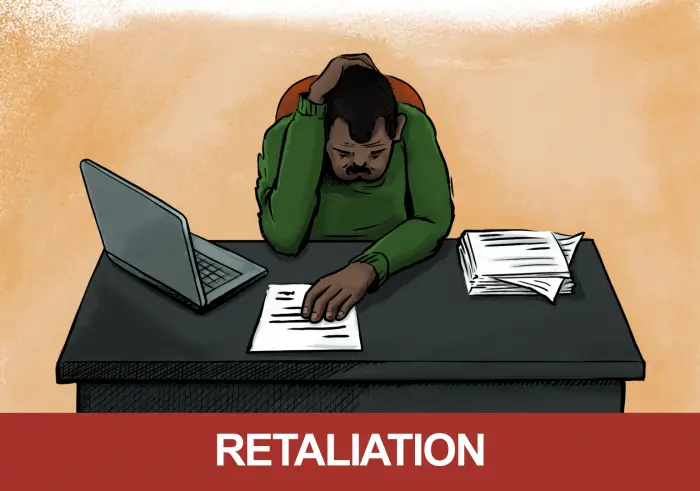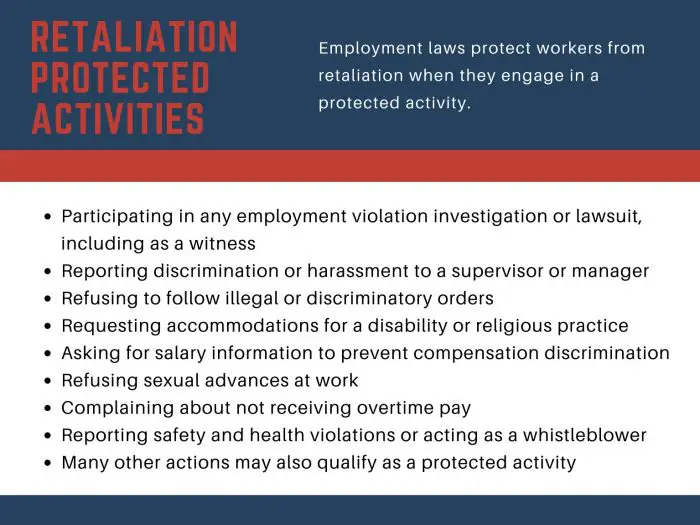Know Your Rights: Retaliation in the Workplace
Protect Your Rights with a Workplace Retaliation Attorney
Did your employer react badly after you complained about discrimination or harassment? Or were you punished for complaining about wage theft, being denied medical leave, or acting as a whistleblower?
These are examples of retaliation – and retaliation is illegal.
Retaliation is the most common form of discrimination. If you are the victim of retaliation, a workplace retaliation attorney can protect your rights.
Contact New York retaliation attorney Charles Joseph for a free consultation to protect your rights today. Charles Joseph has over twenty years of experience with workplace retaliation cases. His firm has recovered more than $200 million for clients. Reach out today for a free, confidential consultation.

Know Your Rights: What is Retaliation?
Is retaliation illegal? When employers punish workers for complaining about employment violations or acting as a whistleblower, that qualifies as retaliation. And it violates your rights.
Learn more by checking out our What is Retaliation FAQ
Employers cannot fire employees for engaging in protected activities. That includes protecting your rights under employment laws.
Employees have retaliation protections when they protect their rights.
Making a complaint about workers’ rights violations is considered a protected activity. When an employee has engaged in a protected activity, he or she is legally protected from retaliatory actions from the employer. If retaliation has occurred, you can file a claim to protect your rights.
For more details on the protections available for particular types of claims, see our resources on discrimination, medical leave, wage theft, and whistleblowers.
Do you have a case? Learn more in our Guide to Filing a Retaliation Lawsuit.
Examples of Workplace Retaliation
Retaliation in the workplace can take many forms. If an employer treats an employee unfavorably because they report certain types of employer wrongdoing, participate in an investigation, or engage in other protected activities, it may violate the law.
Workplace retaliation examples:
- An employee files a discrimination claim against his employer. At the next performance evaluation, the employee receives a very negative review, when prior reviews have all been positive. The employee is placed on probationary status and threatened with firing.
- After acting as a witness in a claim that her employer illegally refused to grant medical leave, an employee is transferred to a less desirable position in the company and loses her supervisory responsibilities.
- After refusing her boss’s sexual advances, an employee is verbally abused by her boss and he spreads false rumors about her. The boss then pulls up the employee’s attendance record and fires her for being five minutes late to work on one occasion.
- A manager threatens to report his employee’s immigration status after the employee complains that he is not receiving the minimum wage. The manager then demands that the employee re-verify his work status.
- After an employee participates in a whistleblower investigation, her boss changes her work schedule to a less desirable shift to punish the employee for hurting the company.
A workplace retaliation attorney can help victims of retaliation determine whether they have a retaliation case against their employer.
How can you build a case? Check out our guide to What makes a strong retaliation case?
Who Is Protected From Retaliation at Work?
The law prohibits employers from punishing job applicants or employees for reporting certain employer wrongdoing. You are protected from retaliation at work if you have participated in a complaint or investigation, along with other protected activities.
Examples of protected activities:
- Making a discrimination complaint either with your employer or an external agency or court, including acting as a witness in an investigation or lawsuit
- Talking to your boss about discrimination or harassment that you have witnessed at your company, including answering questions about discrimination allegations, either during an employer investigation or an external investigation.
- Reporting violations of the minimum wage law, overtime law, or tipped employees laws, as well as any other form of wage theft violation to a government agency.
- Refusing to carry out discriminatory orders, including complaints about discriminatory work practices, advising an employer about compliance with the law, complaining to management about wage disparity, or asking co-workers about salary information to uncover possible wage discrimination.
- Resisting sexual advances, including intervening to protect others from sexual advances.
- Requesting accommodation for a disability or for religious practice.
- Counting a request for medical leave or leave itself as a negative factor in making employment decisions like hiring, promotions, or raises.
- Acting as a whistleblower or participating in an investigation to determine whether your employer committed fraud.
Workplace Retaliation Protections
If you complain about certain types of employer wrongdoing, it is illegal for your employer to take any action against you.
It is illegal for employers to retaliate against applicants or employees who complain about discrimination or harassment on the job, request or take medical leave, act as whistleblowers, or report wage theft. This includes filing a charge with a federal, state, or city agency, or participate, including as a witness, in a proceeding, such as an investigation or lawsuit.
You Are Protected From Retaliation Even If The Underlying Claim Is Rejected
As long as you had a good faith and reasonable belief that certain wrongdoing occurred, your employer cannot take any action against you for speaking out or participating in any investigation or proceeding. It does not matter if an agency or court ultimately determines there was no wrongdoing.
There are limits to retaliation protections, however.
Employers can discipline or terminate workers if they are motivated by non-retaliatory and non-discriminatory reasons. Also, some types of claims must be reported to a government agency before you are protected from retaliation, while other types other claims also offer protection for internal complaints to your employer.
You Are Protected From Retaliation Even If You Were Not The Target
You do not have to be the victim of discrimination, wage theft, or corporate fraud to be protected from workplace retaliation. If you have complained about employer actions that affect other people, retaliation laws may apply to you.
Similarly, employers cannot retaliate against a family member or close friend as a way to punish you. If your employer takes action against someone else, he or she can also file a legal claim for retaliation.
If you speak out about certain types of employer wrongdoing, retaliation laws protect you. A workplace retaliation attorney can help file your retaliation case.
How To File A Retaliation Case
If you are the victim of retaliation at work, you have several options. You can file a complaint with the EEOC or contact a workplace retaliation lawyer for help. State and federal law limit the time to file a charge, so victims should research their options quickly.
You can also learn more about Your Rights based on the type of claim (i.e. Whistleblower, Overtime, Family and Medical Leave Act, and more). Or learn how to file a claim for discrimination for information regarding how to file a claim for retaliation.
A New York retaliation lawyer can help protect your rights. Charles Joseph offers free consultations to discuss your retaliation case.
Workplace Retaliation FAQs

